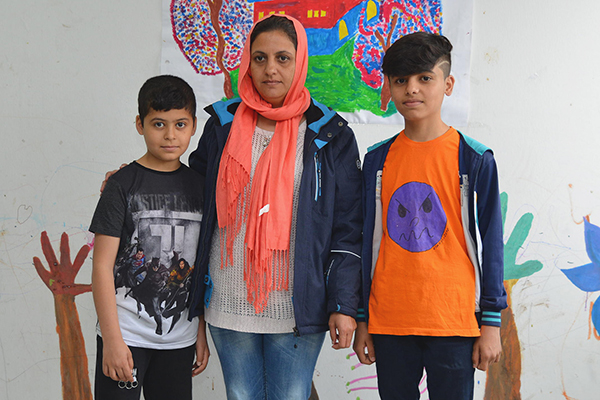 North West Balkans
North West Balkans
Languages
Migrant and refugee children: The hope of a better life

It’s only two days until the School Day celebration and there is excitement in the hallways, all the kids practicing their parts – some singing, some reciting and some dancing folk dances. Sounds as business as usual in primary schools, but it’s not. These children are still new to the local school and they all came from faraway countries such as Syria, Afghanistan or Iraq. These are migrant and refugee children who are currently staying in reception centre Bihac, north-western Bosnia and Herzegovina (BiH).
At the same time, these children are just the same as any other children around the world, and to them at this time, it is of critical importance to remember their words or moves for the school celebration.
10 years old Ali* integrated well in his new neighbourhood. He already plays football in school’s club and wants to be a professional player one day, like his hero, Cristiano Ronaldo. He is happy with his life in Bihac.
“This is a beautiful city, it is very nice here. I go to school, I have friends, we play football together, and we talk. I also like my teacher.”
His older brother, Tariq* (11), remembers their native Afghanistan more.
“It wasn’t good there. There was a war and we were in danger. I was going to school there, but when I wouldn’t do well, the teacher would beat me,” recalls Tariq. He also remembers the good things, his big family and lots of friends, all left behind in search for a better life.
Tariq’s family left Afghanistan three years ago. On their journey, they went through Pakistan, Iran, Turkey, Greece and Serbia, before they came to BiH.
“My brothers were little, my dad carried my youngest brother on his shoulders and I had to help with carrying our things,” says Tariq about the journey.
He now goes to a local school in Bihac. His favourites subjects are math and physics, which will come in handy if he gets opportunity to pursue his dream and learn to become a construction engineer.
His mother, Najila*, says they had to leave Afghanistan.
“The situation in Afghanistan was unbearable. We decided to take this journey because of our children. There is no future for them in Afghanistan. We lived through many difficulties on the road. The boys were young, most of the time we had to carry them, our youngest being only 2 when we left. We walked a lot. Sometimes we were without any food for two days, in some places it was cold and there was snow,” remembers Najila*.
The refuge provided by the reception centre in Bihac means their situation is better now, but it is still not the better life they left their country in search of. As a family with three children, they still share a room with another family.
To date, they have tried to cross the Croatian border 9 times. They once managed the crossing and reached Slovenia, but from there they were deported back to BiH.
Thousands of refugees and migrants travelling through the Western Balkans Route testified about irregular push-backs at various borders in the region. Thousands of people are returned from the countries along the route without being given an opportunity to seek asylum. Hundreds testified about border guards using excessive force, pushing and beating people with hands and batons and taking away their possessions, especially money and phones.
Najila* hopes they will one day reach Germany, where she has a brother, and that is where they hope to make a life for themselves. She also hopes she and her husband will be able to obtain some level of education, along with their children, as they never had a chance for this in Afghanistan.
For families with children staying at the Bihac centre, Save the Children works in partnership with UNICEF to run a mobile Child Friendly Space. Child Friendly Spaces provide a safe environment for the youngest where they can regain the sense of normalcy and structure through organized activities of playing, socialising and learning. Here they can express their fears and reasons for joy. This way, children can rebuild their resilience that will enable their further development.
Save the Children’s team comes on a daily basis to set up a workshop space and help children with their homework, conduct various educational activities or facilitate art projects or fun games. All the activities are carefully created to help children overcome trauma and better cope with dynamics of a life in a migrant and refugee reception centre.
Over 34,000 migrants and refugees reached Bosnia and Herzegovina since the begging of 2018 on their way towards Western European countries. Many of them are forced to temporarily stay in the country after being rejected entry to neighbouring Croatia.
Save the Children is working to provide support to migrant and refugee families with children and unaccompanied and separated children staying in the country. Our child protection team works 24/7 with over 260 unaccompanied and separated children (all of whom are boys staying in Bihac) as well as supporting other social protection centres and front line workers in providing adequate services to the most vulnerable children.
Ensuring no children are left outside education, Save the Children’s team also provide support to refugee and migrant children in school enrolment, including logistical support such as school escorts, transport, school meals and language assistance.For families with young children, we run three operational Mother and Baby Corners in the area, where families with babies and infants can get basic food and hygiene products and services.